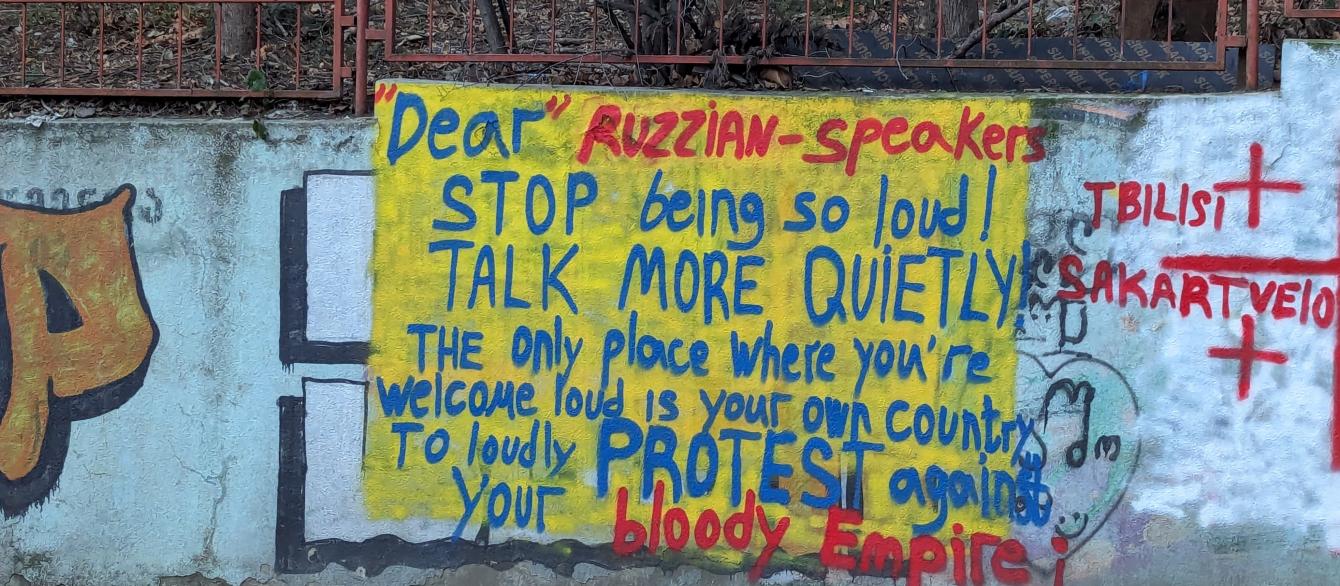This is an excerpt of an article originally published by RFE/RL.
TBILISI — Yekaterina and Aleksandr were never fully comfortable in Georgia.
Like tens of thousands of other Russians, they moved to Tbilisi after the Kremlin launched its full-scale invasion of Ukraine nearly 23 months ago. They managed to work remotely for Russian tech companies and made Georgian friends through their fondness for Dungeons & Dragons and board games.
They grew weary, though, of the frequent electricity and water outages in their neighborhood, and Internet that was slower and far more expensive than what they were used to in Moscow. But it was the low-grade hostility that they felt from Georgians — collective blame for the war — that was the most difficult to get used to.
"They are really supportive of Ukraine because they see themselves in that situation, and I completely understand it," said Yekaterina, who asked to avoid publication of her last name for safety reasons. But at the same time, "no one wants to have to prove every day that they are a 'good Russian.'"
The sudden arrival of tens of thousands of Russians in early 2022 shocked Georgians already stunned by the attack on Ukraine. Many Georgians see Russia as their enemy and oppressor, strongly identified with Ukrainians, and were outraged by their government's passive response to the Russian invasion. The presence of so many Russian newcomers — even ones who appeared to overwhelmingly oppose their government and the war — further heightened tensions.
Now, the Russian newcomers are quietly, but in large numbers, leaving.
The last straw for Yekaterina came when her husband's parents came for a visit last summer. They live in a small town in Russia's south and it was their first trip outside the country. "They were so hyped up, they were like, 'Wow, it's so beautiful,'" she recalled. But one day the whole family got into a taxi in which the driver had posted a sign, in English, reading, "Russians go home."
"I was so happy that they couldn't read English at all," she said. "When I read this message, my god, I almost cried. I sat there and thought, 'Oh no, we have to leave.' It was a really sad moment."
Soon after, they did leave: to Serbia's second city of Novi Sad, on the banks of the Danube River. There, they rent a large downtown apartment for the same price as their smaller former home in a scruffy, remote neighborhood of Tbilisi. In general, Serbs show far less hostility toward Russians than Georgians do, and there is a growing Russian tech population in Serbia that they quickly integrated with.
"It's all about the community," Yekaterina said.
Official statistics indicate that more than 30,000 Russians left Georgia in 2023, slashing the number of wartime Russian immigrants by almost one-third from its peak a year ago.
Once attracted to Georgia as an easy, relatively welcoming refuge from a homeland where they felt increasingly estranged, Russians here have complained of hostility from regular Georgians and bureaucratic roadblocks thrown up by the Georgian government.
Just in the past few months, according to Katya Chigaleichik, an anthropologist who has studied the migration, a critical mass of Russians has started to conclude it is not worth it. She said there is no specific trigger, but rather many have realized that the situation won't get any easier for them in Georgia and they have had enough time to make onward plans.
"People have realized that nothing is changing," she said. "That is exactly the point: Nothing has happened."
The Influx
Russians began fleeing their homeland en masse within days of the Russian troops' full-scale invasion of Ukraine in February 2022. Some left out of disgust over the war, while others feared repression would make life unbearable or that international sanctions would make it impossible to continue to work. Another wave of Russians left in September of that year, when Russian President Vladimir Putin announced a partial mobilization as the war ground on.
In both waves of emigration, Georgia was among Russians' top destinations. It doesn't require them to get visas and shares a land border with Russia, so is relatively cheap to reach. Georgia also has been a favored vacation spot for Russians for generations, and more recently has gained a reputation among young, liberal-minded Russians as a country far freer than their own.
By the end of 2022, about 110,000 Russians had moved to Georgia, according to an extrapolation of statistics from Georgia's Interior Ministry, which counts entries and exits by nationality. The new Russian arrivals were concentrated in the two largest cities, Tbilisi and the Black Sea resort city of Batumi, and in parts of those cities it became common to hear more Russian spoken on the street than Georgian.
Rental prices shot up, and the arrival of so many middle-class consumers revved up the economy: Georgia's gross domestic product (GDP) grew more than 10% in 2022, at least two percentage points of which could be directly attributed to the Russian influx, according to economist Davit Keshelava, who has studied its economic impact.
It also led to an increase in social tension. Public sympathy for Ukraine runs strong in Georgia. And while the overwhelming majority of Russian immigrants say they oppose the war and Putin, many Georgians nevertheless hold them responsible for the conflict and for what they see as Russian bullying of their country over the past two centuries and in particular since Georgia gained independence from the Soviet Union.
Russian troops invaded Georgia during their five-day war in 2008, and since then Moscow has militarily and diplomatically propped up breakaway authorities in the Georgian territories of Abkhazia and South Ossetia in what Georgians say is an occupation of their territory.
The sentiment that all Russians were implicated in the invasion of Ukraine has been particularly strong among young, liberal Georgians — for the most part, the Russian immigrants' peers. Anti-Russian graffiti has blanketed Tbilisi's central neighborhoods, and opposition politicians have campaigned on promises to make it more difficult for Russians to come and to stay.
The Exodus
While it has received little notice in Georgia, the data point to a strong trend of departing Russian expatriates.
About 6,000 more Russians left than entered Georgia in the first six months of last year. The outflow quickened in the third quarter to a net drop of about 14,000 people. In the fourth quarter, the decline was 11,000.
Financial data point to the same trend: In December 2022, remittances from Russia to Georgia amounted to $317 million, much of it thought to be payments from Russian companies to their workers who were living in Georgia. By December 2023, the figure had dropped 78% to $71 million.
© 2024 RFE/RL, Inc. Used with the permission of Radio Free Europe/Radio Liberty.






